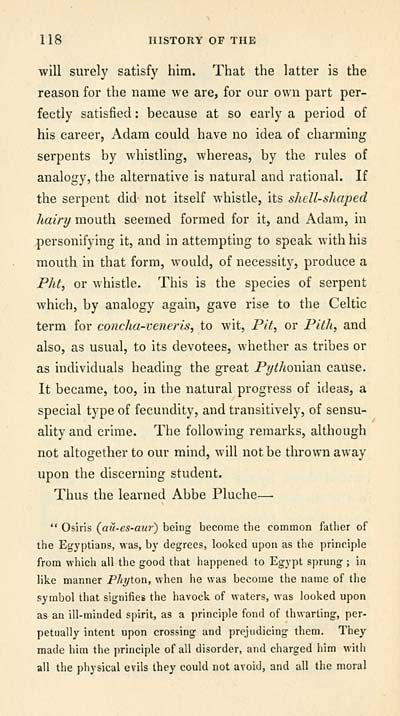Download files
Complete book:
Individual page:
Thumbnail gallery: Grid view | List view

118 HISTORY OF THE
will surely satisfy him. That the latter is the
reason for the name we are, for our own part per-
fectly satisfied : because at so early a period of
his career, Adam could have no idea of charming
serpents by whistling, Avhereas, by the rules of
analogy, the alternative is natural and rational. If
the serpent did not itself whistle, its shell- sJ taped
hairy mouth seemed formed for it, and Adam, in
personifying it, and in attempting to speak with his
mouth in that form, would, of necessity, produce a
Pht^ or whistle. This is the species of serpent
which, by analogy again, gave rise to the Celtic
term for concha-veneris, to wit. Pit, or Pitli, and
also, as usual, to its devotees, whether as tribes or
as individuals heading the great P^^Aonian cause.
It became, too, in the natural progress of ideas, a
special type of fecundity, and transitively, of sensu-
ality and crime. The following remarks, although
not altogether to our mind, will not be thrown away
upon the discerning student.
Thus the learned Abbe Pluche — •
" Osiris (aii-es-aur) being become the common father of
the Egyptians, was, by degrees, looked upon as the principle
from which all the good that happened to Egypt sprung ; in
like manner Phyton, when he was become the name of the
symbol that signifies the havock of waters, was looked upon
as an ill-minded spirit, as a principle fond of thwarting, per-
petually intent upon crossing and prejudicing them. They
made him the principle of all disorder, and charged him with
all the physical evils they could not avoid, and all the moral
will surely satisfy him. That the latter is the
reason for the name we are, for our own part per-
fectly satisfied : because at so early a period of
his career, Adam could have no idea of charming
serpents by whistling, Avhereas, by the rules of
analogy, the alternative is natural and rational. If
the serpent did not itself whistle, its shell- sJ taped
hairy mouth seemed formed for it, and Adam, in
personifying it, and in attempting to speak with his
mouth in that form, would, of necessity, produce a
Pht^ or whistle. This is the species of serpent
which, by analogy again, gave rise to the Celtic
term for concha-veneris, to wit. Pit, or Pitli, and
also, as usual, to its devotees, whether as tribes or
as individuals heading the great P^^Aonian cause.
It became, too, in the natural progress of ideas, a
special type of fecundity, and transitively, of sensu-
ality and crime. The following remarks, although
not altogether to our mind, will not be thrown away
upon the discerning student.
Thus the learned Abbe Pluche — •
" Osiris (aii-es-aur) being become the common father of
the Egyptians, was, by degrees, looked upon as the principle
from which all the good that happened to Egypt sprung ; in
like manner Phyton, when he was become the name of the
symbol that signifies the havock of waters, was looked upon
as an ill-minded spirit, as a principle fond of thwarting, per-
petually intent upon crossing and prejudicing them. They
made him the principle of all disorder, and charged him with
all the physical evils they could not avoid, and all the moral
Set display mode to: Large image | Transcription
Images and transcriptions on this page, including medium image downloads, may be used under the Creative Commons Attribution 4.0 International Licence unless otherwise stated. ![]()
| Early Gaelic Book Collections > Blair Collection > History of the Celtic language > (124) |
|---|
| Permanent URL | https://digital.nls.uk/76179973 |
|---|
| Description | A selection of books from a collection of more than 500 titles, mostly on religious and literary topics. Also includes some material dealing with other Celtic languages and societies. Collection created towards the end of the 19th century by Lady Evelyn Stewart Murray. |
|---|
| Description | Selected items from five 'Special and Named Printed Collections'. Includes books in Gaelic and other Celtic languages, works about the Gaels, their languages, literature, culture and history. |
|---|

